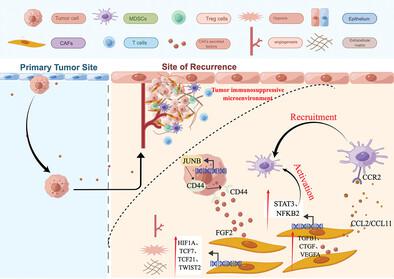Our official English website, www.x-mol.net, welcomes your
feedback! (Note: you will need to create a separate account there.)
Cancer-Associated Fibroblast-Induced Remodeling of Tumor Microenvironment in Recurrent Bladder Cancer
Advanced Science ( IF 14.3 ) Pub Date : 2023-09-24 , DOI: 10.1002/advs.202303230
Ting Liang 1, 2 , Tao Tao 1, 2 , Kai Wu 1, 2 , Lisha Liu 1, 2 , Wuwu Xu 1, 2 , Dewang Zhou 1, 2 , Hu Fang 3 , Qiuxia Ding 1, 2 , Guixiao Huang 1 , Song Wu 1, 2, 3
Advanced Science ( IF 14.3 ) Pub Date : 2023-09-24 , DOI: 10.1002/advs.202303230
Ting Liang 1, 2 , Tao Tao 1, 2 , Kai Wu 1, 2 , Lisha Liu 1, 2 , Wuwu Xu 1, 2 , Dewang Zhou 1, 2 , Hu Fang 3 , Qiuxia Ding 1, 2 , Guixiao Huang 1 , Song Wu 1, 2, 3
Affiliation

|
Bladder carcinoma (BC) recurrence is a major clinical challenge, and targeting the tumor microenvironment (TME) is a promising therapy. However, the relationship between individual TME components, particularly cancer-associated fibroblasts (CAFs), and tumor recurrence is unclear. Here, TME heterogeneity in primary and recurrent BC is investigated using single-cell RNA sequence profiling of 62 460 cells. Two cancer stem cell (CSC) subtypes are identified in recurrent BC. An inflammatory CAF subtype, ICAM1+ iCAFs, specifically associated with BC recurrence is also identified. iCAFs are found to secrete FGF2, which acts on the CD44 receptor of rCSC-M, thereby maintaining tumor stemness and epithelial-mesenchymal transition. Additionally, THBS1+ monocytes, a group of myeloid-derived suppressor cells (MDSCs), are enriched in recurrent BC and interacted with CAFs. ICAM1+ iCAFs are found to secrete CCL2, which binds to CCR2 in MDSCs. Moreover, elevated STAT3, NFKB2, VEGFA, and CTGF levels in iCAFs reshape the TME in recurrent tumors. CCL2 inhibition in an in situ BC mouse model suppressed tumor growth, decreased MDSCs and Tregs, and fostered tumor immune suppression. The study results highlight the role of iCAFs in TME cell–cell crosstalk during recurrent BC. The identification of pivotal signaling factors driving BC relapse is promising for the development of novel therapies.
中文翻译:

复发性膀胱癌中癌症相关成纤维细胞诱导的肿瘤微环境重塑
膀胱癌(BC)复发是一个重大的临床挑战,而针对肿瘤微环境(TME)是一种有前途的治疗方法。然而,各个 TME 成分,特别是癌症相关成纤维细胞 (CAF) 与肿瘤复发之间的关系尚不清楚。在这里,使用 62 460 个细胞的单细胞 RNA 序列分析研究了原发性和复发性 BC 中的 TME 异质性。在复发性乳腺癌中发现了两种癌症干细胞 (CSC) 亚型。还确定了与 BC 复发特别相关的炎症性 CAF 亚型 ICAM1+ iCAF。研究发现 iCAF 分泌 FGF2,作用于 rCSC-M 的 CD44 受体,从而维持肿瘤干性和上皮间质转化。此外,THBS1+ 单核细胞是一组骨髓源性抑制细胞 (MDSC),在复发性 BC 中富集并与 CAF 相互作用。研究发现 ICAM1+ iCAF 会分泌 CCL2,CCL2 与 MDSC 中的 CCR2 结合。此外, iCAF 中STAT3、NFKB2、VEGFA和CTGF水平升高重塑了复发肿瘤中的 TME。原位 BC 小鼠模型中的 CCL2 抑制可抑制肿瘤生长,减少 MDSC 和 Tregs,并促进肿瘤免疫抑制。研究结果强调了 iCAF 在复发性 BC 期间 TME 细胞间串扰中的作用。识别驱动 BC 复发的关键信号因子对于开发新疗法来说是有希望的。
更新日期:2023-09-24
中文翻译:

复发性膀胱癌中癌症相关成纤维细胞诱导的肿瘤微环境重塑
膀胱癌(BC)复发是一个重大的临床挑战,而针对肿瘤微环境(TME)是一种有前途的治疗方法。然而,各个 TME 成分,特别是癌症相关成纤维细胞 (CAF) 与肿瘤复发之间的关系尚不清楚。在这里,使用 62 460 个细胞的单细胞 RNA 序列分析研究了原发性和复发性 BC 中的 TME 异质性。在复发性乳腺癌中发现了两种癌症干细胞 (CSC) 亚型。还确定了与 BC 复发特别相关的炎症性 CAF 亚型 ICAM1+ iCAF。研究发现 iCAF 分泌 FGF2,作用于 rCSC-M 的 CD44 受体,从而维持肿瘤干性和上皮间质转化。此外,THBS1+ 单核细胞是一组骨髓源性抑制细胞 (MDSC),在复发性 BC 中富集并与 CAF 相互作用。研究发现 ICAM1+ iCAF 会分泌 CCL2,CCL2 与 MDSC 中的 CCR2 结合。此外, iCAF 中STAT3、NFKB2、VEGFA和CTGF水平升高重塑了复发肿瘤中的 TME。原位 BC 小鼠模型中的 CCL2 抑制可抑制肿瘤生长,减少 MDSC 和 Tregs,并促进肿瘤免疫抑制。研究结果强调了 iCAF 在复发性 BC 期间 TME 细胞间串扰中的作用。识别驱动 BC 复发的关键信号因子对于开发新疗法来说是有希望的。































 京公网安备 11010802027423号
京公网安备 11010802027423号